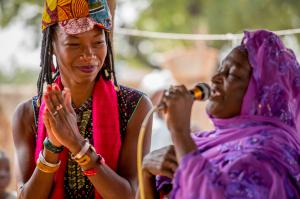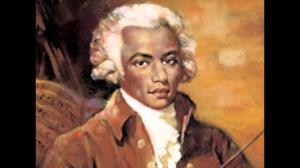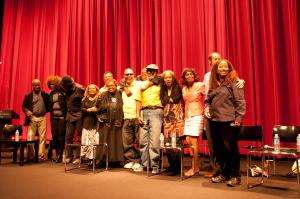Non-Fiction Films In The 24th Annual African Diaspora International Film Festival (ADIFF)
Over 20 Non-fiction films cover a variety of topics in ADIFF NY 2016
“Black Ballerina is an important documentary that asks important questions about this traditional and beloved art form.”
NEW YORK, NY, USA, November 21, 2016 /EINPresswire.com/ -- ADIFF is back for its 24th edition from Nov. 25 to Dec. 11 with a total of 66 films from 30 countries including 34 US and NY Premieres. Screenings will be held in three venues in Manhattan: Teachers College, Columbia University, Cinepolis Chelsea Cinemas and MIST Harlem.— John Soltes of the Hollywood Soapbox
Non- fiction films cover a variety of topics in ADIFF NY 2016
Leading the selection is Zeinabu Irene Davis’ "Spirits of Rebellion: Black Cinema From UCLA". The film tells the story of one of the most dynamic groups of black filmmakers in America and their aim of changing the narrative of black films in this country. "Spirits of Rebellion" is ADIFF 2016 Closing Night film.
Senegal is the destination of the documentaries in the Senegal Connection Program, fundamentally addressing the issue of connection among people with a common origin but little mutual understanding. The two films in the program are rooted in a very strong Pan-African spirit. In "Youssou N’Dour : Return To Goree" by Pierre-Yves Borgeaud, we witness the musical and historical journey in which the Senegalese griot/singer Youssou N’Dour embarks to pay homage to the creativity and resilience of Africans in the diaspora. In "Walk All Night: A Drum Beat Journey" by Mallory Sohmer and Kate Benzschawel, we follow a trip that an African Social Worker and an African-American African dance teacher organize for four bucket players from the Chicago South Side to be able to visit Dakar and be exposed to Senegalese music and culture.
Another African singer, Fatoumata Diawara, is one of the main performers in "Mali Blues" by Lutz Gregor a TIFF DOC official selection to have a sneak preview screening in ADIFF. This musical documentary follows her in her journey to the Niger Festival in her native Mali where she performs with several other Malian artists who are using their art to fight against Islamic extremists in the region.
Cuba is once again a popular topic of conversation. However, the essence of the Cuban people is still missing in many of the visual work to which we are exposed. The documentary "Ghost Town to Havana" by Eugene Corr uses baseball as a metaphor to explain how the American and Cuban societies treat their children. The film speaks about Cuba and its population without presenting the frequent clichés of music and happy people.
Another Cuban documentary will have its NY Premiere in ADIFF. Gloria Rolando has an extensive body of work on the African experience in Cuba. In "Dialog With My Grandmother," the filmmaker enters in a rich conversation with her grandmother who talks about Cuba, many years before the Cuban Revolution of 1959. Enriched with music and archival footage, Dialog With My Grandmother is one of those films that transport the viewer to a time when race and class relations in Cuba were marked by severe racial discrimination, open racism and violence against African descendants.
Also set in the Caribbean part of the Americas, "Death By A Thousand Cuts" by Jake Kheel and Juan Mejia Botero, describes the tense situation in the Haitian-Dominican border. This time, the murder of a Park Ranger is the context that demonstrates the corruption, violence and tense situation between two communities that share the same land.
ADIFF 2014 documentary, "Tango Negro: The African Roots of Tango" by Dom Pedro, eloquently talks about the African roots of Tango and the African presence in Argentina and Uruguay. "Gurumbe: Afro-Andalusian Memories" by M. Angel Rosales is about Flamenco, the African presence in Spain and Portugal and the state of affairs of race relations in Spain. Well documented with a great intellectual rigor, the film goes into areas of Spanish culture seldom covered in Spanish films.
Black Mexicans have been denied recognition for quite some time. The 2015 Intercensus Estimate was the first time in which Afro-Mexicans could identify themselves as such. However, the debate continues, as the ambiguous terminology of afro-descendants is now the preferred label rather than “Black,” which is controversial.
The film "Invisible Roots: Afro-Mexicans in Southern California" by Tiffany Walton narrates the life of the black Mexicans of Southern California. This is not an easy film to watch, as we see and hear these men and women narrate the stories of their lives in a very narrow minded environment where most of the people seem not to understand the fact that people of African descent have roots in all countries in the Americas.
The Black Australia program will focus on the work of Darlene Johnson, an Australian Aboriginal filmmaker, whose impressive work is focused on the Australian Aboriginal experience. Topics in the films selected include the exploration of Australia’s colonial past including the history of the stolen Australian Aboriginal children and the life and work of David Gulpilil, a very important Australian Aboriginal actor whose talent is displayed in several of the films in the program.
The troubles and tribulations of Black aspiring ballerinas is the content of the film "Black Ballerina" by Frances McElroy, a very rich work of historic footage, interviews and reflection on the conditions of race relations and art in the United States of America. “Diversity in the dance world is a necessity” writes John Soltes of the Hollywood Soapbox, “Black Ballerina is an important documentary that asks important questions about this traditional and beloved art form.”
Edythe Boone is a very dynamic community artist who is portrayed in "A New Color: The Art of Being Edythe Boone" by Marlene “Mo” Morris, a rich documentary that shows the vibrancy of this artist who is 78 years young.
Other important documentaries in ADIFF 2016 are: "Nana"/"Nanny" by Tatiana Fernandez Geara, a film about Dominican women who take care of children of wealthy families as they leave their children back home; "Maria Bethania: Music Is Perfume" by Georges Gachot, "Seeking Asylum" by Darnell Lamont about a group of African-American millennials wo decide to apply for asylum in Europe seeking to escape the American system,and "A Fergurson Story" by Lonnie Edwards who describes police brutality.
Diarah N'Daw-Spech
African Diaspora International Film Festival
2128641760
email us here
Ghost Town to Havana @ ADIFF 2016
Legal Disclaimer:
EIN Presswire provides this news content "as is" without warranty of any kind. We do not accept any responsibility or liability for the accuracy, content, images, videos, licenses, completeness, legality, or reliability of the information contained in this article. If you have any complaints or copyright issues related to this article, kindly contact the author above.



